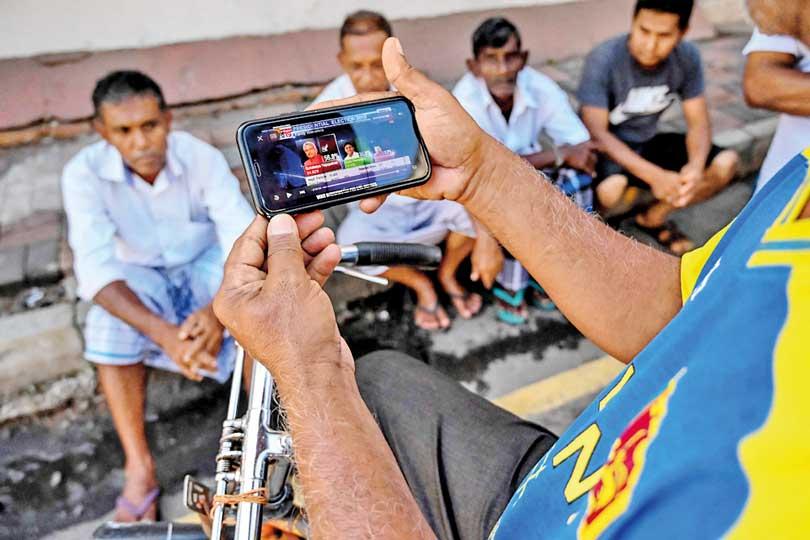Reply To:
Name - Reply Comment

Sri Lankans have always been in a mighty hurry to celebrate in the name of the winner after an election, without considering what would happen to their futures (File photo)
 This is a cricket crazy nation where every islander is loyal to the national cricket team. There was a time when most shopping malls selling televisions would switch on at least one tv and offer some entertainment to passersby. On Test match days, we’d see people standing on the road soaking up the action with their eyes glued to televisions, owned by store owners. Right now, the focus is on the upcoming Presidential Elections, and a Sri Lankan victory over England in the Third Test at the Oval doesn’t seem to have produced the expected excitement. There is a bigger match scheduled for September 21 (Saturday). A recent Facebook post summed up the challenge ahead of Sri Lankans in taking the right decision as to whom to vote at the next elections. The post read, ‘Presidential elections; a scholarship exam for Sri Lankan adults’. It’s a reminder to adult voters that if you fail this ‘test’ you’re doomed to experience a lifetime of misery. Yes, the adults of this country have realised quite painfully that though their loyalty should remain with the national cricket team, their alliances, from a political sense, should now shift to a party which offers ‘opportunities’ for everyone.
This is a cricket crazy nation where every islander is loyal to the national cricket team. There was a time when most shopping malls selling televisions would switch on at least one tv and offer some entertainment to passersby. On Test match days, we’d see people standing on the road soaking up the action with their eyes glued to televisions, owned by store owners. Right now, the focus is on the upcoming Presidential Elections, and a Sri Lankan victory over England in the Third Test at the Oval doesn’t seem to have produced the expected excitement. There is a bigger match scheduled for September 21 (Saturday). A recent Facebook post summed up the challenge ahead of Sri Lankans in taking the right decision as to whom to vote at the next elections. The post read, ‘Presidential elections; a scholarship exam for Sri Lankan adults’. It’s a reminder to adult voters that if you fail this ‘test’ you’re doomed to experience a lifetime of misery. Yes, the adults of this country have realised quite painfully that though their loyalty should remain with the national cricket team, their alliances, from a political sense, should now shift to a party which offers ‘opportunities’ for everyone.
If one compares Sri Lanka with Bangladesh, the former has gone through the bitterest of winters, politics wise, and is on a path to recovery. Sadly, it’s a deadlock or stalemate situation in Bangladesh because after the ousting of Premier Sheikh Hasina, there is communal violence in the country. It is reported that Muslim mobs are attacking Hindus; with the latter’s businesses and temples coming under attack. We saw a reflection of this violence back in 1983 in Sri Lanka when the majority Sinhalese went on the rampage, burning and looting the properties of the Tamil minority. This situation then led to a full-scale civil war on the island. Bangladesh, now under an interim administration, must do all that’s possible to avoid a civil war.
When we look at present Bangladesh, we are also reminded of 2022 when a fierce protest (Aragalaya) overthrew a regime and its president, who was elected by the people’s vote. Sri Lanka, on the surface, seems to be moving towards some stability under a government led by Ranil Wickremesinghe; who is also a candidate at the next presidential elections. It’s hard to undermine the credibility of this regime in terms of managing and resurrecting a fallen economy. But people – the voters – are demanding answers for questions asked about financial frauds, loss-making decisions and misuse of state funds. When such questions go unanswered by the present regime, it puts Sri Lanka in the same boat as any other corrupt nation.
It is in this context that focusing on Bangladesh, post Hasina, underscores the importance of corrupt leaders of any regime being prosecuted for crimes committed. When we read the pulse of the people, there are great concerns whether lawmakers who broke the law will go into exile and escape punishment in the event there is a regime change in Sri Lanka. For the record, Bangladesh is now planning to seek help from the International Crimes Tribunal to secure extradition of ousted leader Hasina from India. What would facilitate this move is an existing criminal extradition treaty Bangladesh has with India. The treaty was signed in 2013. Hasina faces trial for the deadly violence waged by the authorities against protesters, who were agitating against a state job allocation procedure which they (protesters) termed as unfair. This is food for thought for Sri Lanka; in case some of our ‘merry making’ lawmakers feature in a great escape after the elections.
There is much talk and speculation that in the event the National People’s Power emerges the victor at the next elections, there could be help coming Sri Lanka’s way from China. This is in terms of receiving some concessions regarding China’s existing loans given to Sri Lanka. These talks are fuelled by historic records that Shino-Sri Lankan relations have been strong when left-of-centre parties or politicians were in charge of the island’s politics. But in reality, it seems that China has chosen not to engage itself much with Sri Lanka from the time when the covid pandemic ended up till now. This could be because the past two Sri Lankan governments have not been reliable partners of China. Fingers are pointed at Sri Lanka for reneging on commitments given to China due to Indian influence. China is a country which avoids getting into stalemate situations.
Some of the biggest superpowers in the world are watching with interest the outcome of Sri Lanka’s next elections. There are predictions already that no candidate would win a majority at the elections. There is talk that elections officials will have to count preferential votes as another option to find a winner. But what must be underscored here is that an already troubled Sri Lanka needs a clear-cut winner at the elections to enable the country to go for a fresh start in rebuilding this nation. Finding a winner at the next elections is the wish of both the people of Sri Lanka and also the members of the international community. Hence, anything other than seeing a clear cut winner at the elections would put Sri Lanka in a stalemate position and invite chaos again into the country. When uncertainty is invited through ‘man-created disaster’ it pushes prices of goods and services up and makes existence a living hell; this is despite Sri Lanka being a paradise and has lands for agriculture, fish to catch and a name in the hospitality trade that can lure foreigners to its tourism hotspots.
For an outsider, Sri Lanka has everything. Come election time, if there is something that we lack badly, it is the inability to unite under one umbrella for a national cause. Surprisingly though, we showed this unity on two rare occasions and one was when defeating terrorism on the island. The other occasion was to usher in independence. Sadly, we are unable to unite to root out corruption. If Sri Lanka must change anything it must change the inability to unite; and Sri Lankans must believe they can do that!